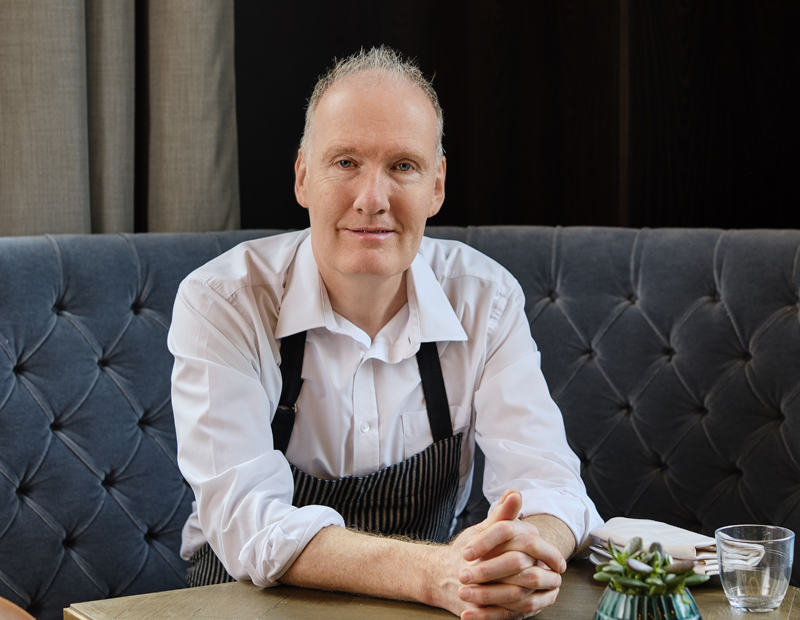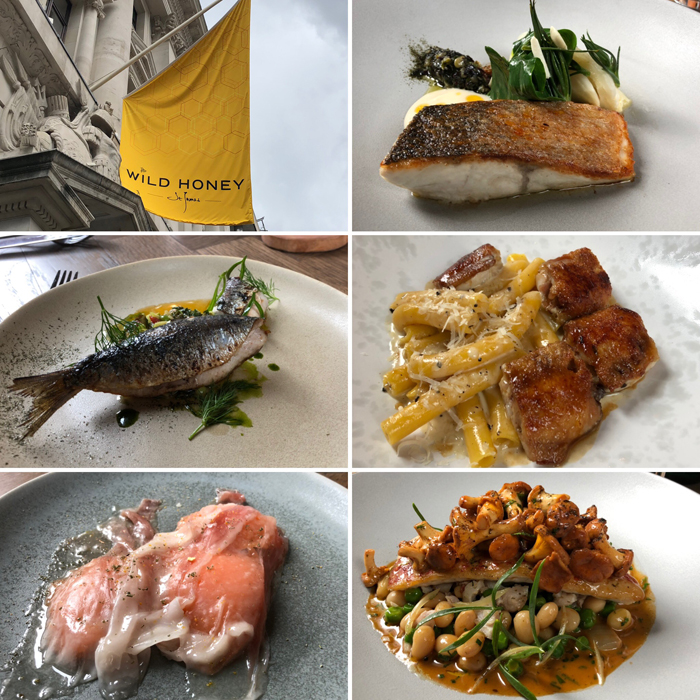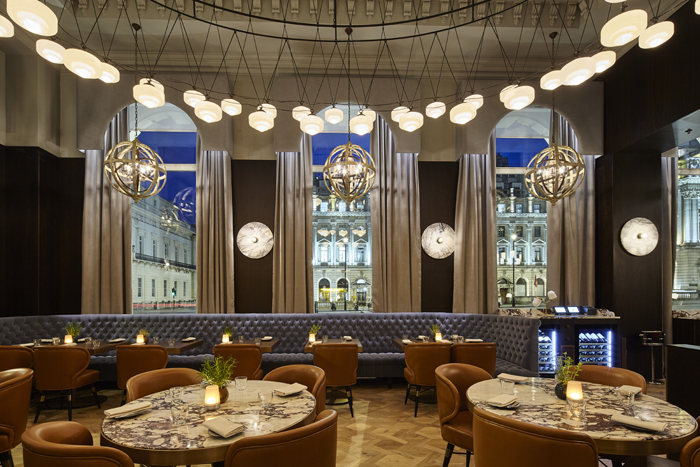
Anthony’s ambition was far from being a chef, his early dream was to join the fleet air arm division of The Royal Navy and fly jets. He signed up for twenty-two years but a short time into basic training suffered a recurrent knee dislocation, which subsequently meant leaving under medical discharge.
Anthony retained fond memories of watching his grandmother cook – both grandparents on his father’s side were of Greek origin – and food was always a big part of their lives. Kleftiko or Avgolemono were classic Greek dishes prepared by his grandmother. Anthony also happily remembers, as an eight year old, bouncing lead shot on his plate found in a meal of game. On a Sunday morning, the family would go to Greek Orthodox church and then come home to have a big family lunch – up to a dozen with aunts and uncles and three young children, in an event that would last much of the day; food and family were so important.
So when recuperating from knee surgery years later, Anthony had time to reflect on what he wanted to do going forward, he saw himself as practical, creative and with a fastidious attention to detail and leaning on his childhood memories, as a naïve twenty-one year old, he took his first professional chef steps as a stagier at Raymond Blanc’s Le Manoir.
Some time later, foodies may remember a couple of shows in the late ‘80’s that were filmed at Marco Pierre White’s Harvey’s, Anthony had joined that kitchen while one of these aired and briefly shared a flat with Stephen Terry and Gordon Ramsay. “Gordon stayed in that extraordinary but brutal kitchen for four years, the man is made of steel,” fondly remembers Anthony.
In 1991, having worked for Gary Rhodes at The Castle, Taunton, Anthony followed Rhodes to The Greenhouse – where he rose from chef de partie to sous chef over the next two years. This was followed by the decision to work for one of the great instinctive chefs of his time at Inn on the Park at The Four Seasons Hotel, Park Lane. For nearly three years Bruno Loubet ran the kitchen as one of the stand out restaurants of its time, widely considered by foodies as the strongest potential Michelin two star candidate of it’s day. Such was the allure, that initially having taken a pay cut and a reduced role of chef de partie, Anthony quickly earned his stripes in that kitchen. It was therefore a logical progression that when Loubet launched Bistrot Bruno, Anthony moved with him to Soho.
The two continued to work together to open a second site, L’Odéon, in Regent Street, where Anthony assumed his first head chef position and remained for a further three years. Anthony found Bruno Loubet inspirational as a mentor and saw parallels in drive and levels of sheer ability with Marco (Pierre White), in what was a highly rewarding period of both of their careers.
In 1999, Anthony was appointed chef/director of Putney Bridge and in January 2000 the restaurant was awarded a first Michelin star along with four AA Rosettes. Will Smith, the restaurant manager from L’Odéon had joined Anthony at Putney Bridge and they spent nearly seven years as a cohesive kitchen and front of house team.

[Above: A Selection of dishes from Anthony Demetre’s latest venture at Wild Honey Sofitel, London St James’]
In 2006, Will and Anthony launched Arbutus in Soho. Together they pioneered the ’bistronomy’ style of offering in London; Arbutus demonstrated that food previously considered for a fine dining environment, may be accompanied by a
In 2007, Anthony and Will opened a second site with Wild Honey in Mayfair and the restaurant also won a Michelin star within just a few months of operating. Anthony published his first cookbook in 2008 – ‘Today’s Special’ – which explained his approach to modern day dining. 2010 marked the duo’s third restaurant, Les Deux Salons in Covent Garden, which echoed the style of Montparnasse brasseries in Paris. (The restaurant was sold in 2014 to Prescott & Conran.)
After 20 years business partnership together, 1996 to 2016, Will Smith decided to move out of London and leave the partnership, consequently Anthony and Will sold Arbutus, while Anthony continued to run Wild Honey in Mayfair as an independent solo business. “The move naturally took a period of adjustment,” reflects Anthony.
In October 2018, Anthony opened Vermuteria Café & Bar in the newly developed Coal Drops Yard, King’s Cross, with business partner and designer Michael Sodeau. Reflecting Anthony’s three passions – food, cycling and Vermouth – the site opened with an interior inspired by the sport’s golden age, while offering all day dining, as well an extensive selection of Vermouths. Indeed his passion for road cycling, has also led him to craft bespoke menus for the Grand Tours of Giro d’Italia, the Tour de France, and the Vuelta with the Rapha Cycling Club.
While the fixed costs associated with running Wild Honey in Mayfair were under review, the time was right to start a new Wild Honey restaurant in the Sofitel London St James. In June 2019 the new offering opened its doors to customers. The re-imagined Wild Honey is on a site nearly twice the size of its Mayfair predecessor, in a room with significant grandeur that is, however, underplayed with a relaxed, informal and inclusive feel. The introduction of all day dining with a café menu that runs in the afternoon, makes it attractive and accessible to a wider audience. In a way the previous Wild Honey was more of an evening restaurant as the space lent itself to more formal dining in a club-like atmosphere.

[Above: The new Wild Honey at Sofitel London St James]
For Anthony the new site is like a new lease of life, where he sees the long game of the restaurant world as continually progressing and re-inventing to satisfy both your existing client base while actively appealing to a new audience. The subtle theme of change between the old and new Wild Honey exemplifies this perfectly. This allows restaurants to remain relevant and encourage guests to visit and revisit with frequency.
When hiring in the kitchen, Anthony is less interested in the CV and more the sheer enthusiasm for food of a candidate. “What do they cook at home and what is their favourite dish to cook?” If they can’t answer that then the CV doesn’t matter, “you can teach chefs skills so hire based on attitude and the skills will naturally follow, a potential for passion for the craft is as important as the passion itself, part of the role of the head chef is to inspire that in their brigade,” considers Anthony.
Anthony is pleased to see the top end of the industry move away from the brutal hours that young chefs used to have to work, including split shifts. He feels that good mentoring partly includes encouraging a sound work-life balance from the outset, although this is given the assumption of natural enthusiasm that can be guided in the right way by the right mentor. In terms of the future, Anthony feels that perhaps he and Will Smith may be remembered as signalling a change in the London dining scene with the introduction of Arbutus and its associated concept. In addition, Anthony continues to have the happy knack of continuous reinvention that retains his relevancy in each era of dining in London, without being a follower of fashion. No doubt, Anthony’s ventures will continue to go from strength to strength, as an instinctive chef’s chef and an astute restaurateur, who is appreciated and respected by his peers while being followed by a loyal and



